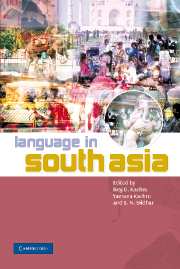Book contents
- Frontmatter
- Contents
- List of Figures
- List of Maps
- List of Tables
- Preface
- Acknowledgments
- List of Abbreviations
- Note on Transcription
- Introduction: languages, contexts, and constructs
- Part 1 Language history, families, and typology
- Part 2 Languages and their functions
- Part 3 Sanskrit and traditions of language study
- Part 4 Multilingualism, contact, and convergence
- Part 5 Orality, literacy, and writing systems
- Part 6 Language conflicts
- Part 7 Language and modernization
- Part 8 Language and discourse
- 17 Language in social and ethnic interaction
- 18 Language and the legal system
- 19 Language in the media and advertising
- 20 Language in cinema
- 21 Language of religion
- Part 9 Language and identity
- Part 10 Languages in diaspora
- References
- Subject Index
- Language Index
- Author Index
18 - Language and the legal system
Published online by Cambridge University Press: 04 May 2010
- Frontmatter
- Contents
- List of Figures
- List of Maps
- List of Tables
- Preface
- Acknowledgments
- List of Abbreviations
- Note on Transcription
- Introduction: languages, contexts, and constructs
- Part 1 Language history, families, and typology
- Part 2 Languages and their functions
- Part 3 Sanskrit and traditions of language study
- Part 4 Multilingualism, contact, and convergence
- Part 5 Orality, literacy, and writing systems
- Part 6 Language conflicts
- Part 7 Language and modernization
- Part 8 Language and discourse
- 17 Language in social and ethnic interaction
- 18 Language and the legal system
- 19 Language in the media and advertising
- 20 Language in cinema
- 21 Language of religion
- Part 9 Language and identity
- Part 10 Languages in diaspora
- References
- Subject Index
- Language Index
- Author Index
Summary
Introduction
In South Asia, law and language are inextricably intertwined not only in the construction and consumption of sociolegal relationships and in the authorization of sociopolitical and individual actions but also in the creation of social structures, the nurturing and shaping of political ideologies, and the negotiation of social and individual identities. In order to have a comprehensive understanding of the role and function of language in legal systems, it is necessary to specify the complexity of interpretations of some of the terms and issues arising from this dynamic relationship, especially in the contexts of multilingual and multicultural contexts.
First, although legal systems are invariably influenced by religion and culture, they have an inseparable relationship with language, which is typically used as an instrument of legal expression, both in spoken and written forms. We are more familiar with the use of written language as a vehicle for the communication of legal content in modern times, but the use of speech in legal settings was common in ancient times. The ancient Indian legal systems provide good examples of such uses of speech in legal contexts. The legal system during the Vedic period created social norms to regulate human behavior, but there were no facilities to record these rules and regulations in the written form. The social code embodied in the Shruti was memorized and handed down from one generation to another.
- Type
- Chapter
- Information
- Language in South Asia , pp. 361 - 376Publisher: Cambridge University PressPrint publication year: 2008
- 1
- Cited by



